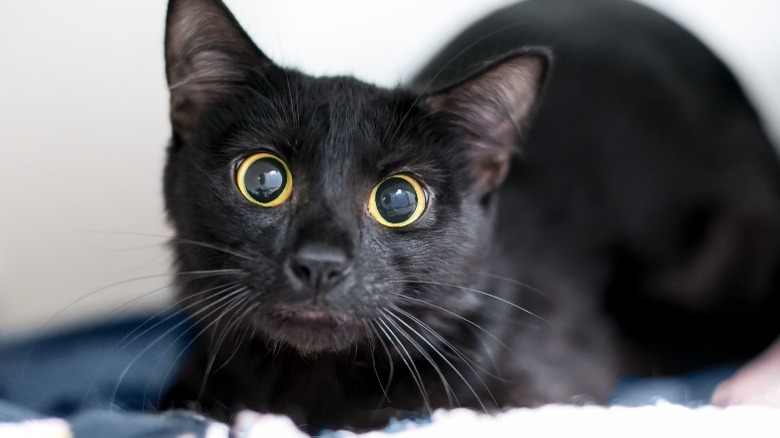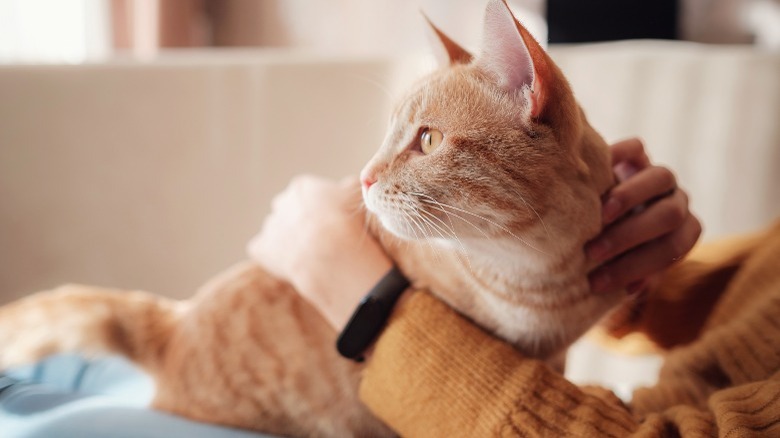If You Feel Like Your Cat Doesn't Listen To You, A Study May Prove That You're Right
Most cat owners, or at least people who live with a cat, have suspected that felines don't listen to humans — the human speaks, the cat ignores. Now, there's some solid evidence that those suspicions are true. A study recently conducted in France tested how cats respond to different human voices and voice tones. The test subjects were 16 pet cats of veterinary students. Most of the cats lived in small spaces with their humans and were kept indoors (via All That's Interesting). They were studied in their homes with their humans present, and the cats had met the experimenters before. According to Science Alert, this was done so the cats would be at ease and act naturally.
The study consisted of four recordings being played for the cats while the cats went about their usual routines. The recordings included one of their human speaking to them, one of their human speaking to another human, one of a stranger speaking to the cat, and one of the stranger speaking to another human. The speech in the recordings aimed at the cat were intentionally affectionate. The experimenters watched the cats from another room (via All That's Interesting).
The study's results
The scientists found that the cats often reacted to the recordings of their human speaking to them. They watched for clear signs of listening, like meowing, turning around, or turning their ears toward the sound, per Science Alert. They also looked for more subtle reactions: the cats moving their tails or purring, and their eyes dilating (via All That's Interesting). The cats' behavior didn't change when the other recordings were played, according to Science Alert. When their humans were speaking to someone else, the cats seemed to understand that.
Psychology Today explains that most people talk to their pets as well as children in a specific way adapted to their listeners. This includes more repetition and articulation than usual. All That's Interesting explained that the cats responded most when their humans spoke in high-pitched tones and short phrases, also typical of pet or child-directed speech. Other studies have shown that dogs react to the same way of speaking. However, since the cats didn't react when a different human spoke to them in the same manner, it may mean they respond to it only because they're used to being spoken to that way, not because they particularly like it.
Apparently, domestic cats also adapt their speech for us. Psychology Today says cats meow more if their humans speak to them often, and they usually don't meow at other cats. They also purr in a higher pitch for humans, because humans respond more to this, per All That's Interesting.
Implications of the study
The conductors of the experiment acknowledged that other cats might respond differently than the ones they studied, since the cats studied mostly lived with only one human and didn't go outside. Cats who interact with more humans, more often, such as those who live in cat cafés, might respond more to an unknown human's "pet-directed" voice, according to All That's Interesting. Charlotte de Mouzon, who conducted the study at the Université de Paris Nanterre, says the results could imply that these indoor pets only know their humans' voices, that they have learned what tones are directed at them, or both (via Psychology Today). So while yes, your cat can recognize that you're talking to it, they can likewise choose to absolutely ignore you. It's not just your imagination.
While this study confirms that cats can choose whether or not to pay attention to you, it also aligns with other recent studies that suggest cats do bond significantly with their humans (per Psychology Today). De Mouzon says it also confirms that cats are very communicative. She says specific, pet-directed speech "helps to reinforce a good relationship with your cat."


